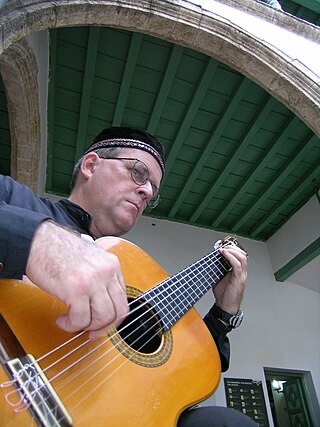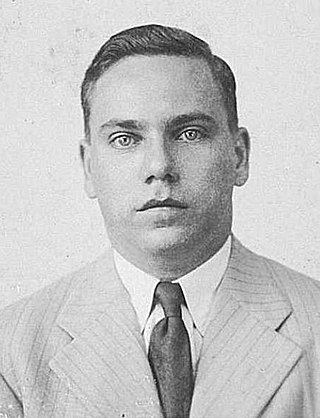Related Research Articles
The music of Cuba, including its instruments, performance, and dance, comprises a large set of unique traditions influenced mostly by west African and European music. Due to the syncretic nature of most of its genres, Cuban music is often considered one of the richest and most influential regional music in the world. For instance, the son cubano merges an adapted Spanish guitar (tres), melody, harmony, and lyrical traditions with Afro-Cuban percussion and rhythms. Almost nothing remains of the original native traditions, since the native population was exterminated in the 16th century.
Antonio Lauro was a Venezuelan musician, considered to be one of the foremost South American composers for the guitar in the 20th century.
Alirio Díaz was a Venezuelan classical guitarist and composer, considered one of the most prominent composer-guitarists of South America and an eminent musician. He studied with Andrés Segovia, and gave concerts all over the world.
Relly Raffman (1921–1988) was a composer and professor of music at Clark University in Worcester, Massachusetts.
Rodrigo Riera, was a Venezuelan guitarist and composer. He wrote a vital and important body of works for the guitar, inspired by and dedicated to the rich musical legacy of his region in the Lara state in Western Venezuela, displaying a loving nationalism that led him to be associated with the work of Antonio Lauro but with a technique that is more accessible to beginners and intermediate guitar players.
Juan Antonio Orrego-Salas was a Chilean composer, musicologist, music critic, and academic.
Michael O'Toole is an Irish classical guitarist.
Lamont School of Music is the school of arts of the University of Denver, based in city of Denver, United States. In 1941, the school merged with the University of Denver.
Flores Chaviano is an accomplished Cuban composer, guitarist, professor and orchestral conductor that has achieved great international recognition.
The guitar was the first instrument that was heard in Cuba after the conch horns, flutes and drums that the original aborigines used to play; as it was documented by Spanish chroniclers such as Bernal Díaz del Castillo. Through the centuries, the guitar has continued to be one of the most important and cherished instruments in Cuba, both in the practice of popular music as well as in the classical music tradition. Founded by renowned professors such as Clara Romero, Isaac Nicola, Clara (Cuqui) Nicola, Carlos Molina, and Marta Cuervo Riverón, the Cuban guitar school has acquired an excellent international reputation since the 20th century, represented by important instrumentalists and composers such as Leo Brouwer, Carlos Molina, José Rey de la Torre, Juan Antonio Mercadal and Joaquín Clerch, among many others.

Luis Manuel Molina de Varona is a Cuban musician, concert guitarist, composer, arranger, musical director, broadcaster and radio producer.
After its arrival in Cuba at the end of the 18th century, the pianoforte rapidly became one of the favorite instruments among the Cuban population. Along with the humble guitar, the piano accompanied the popular Cuban guarachas and contradanzas at salons and ballrooms in Havana and all over the country.
Miguel Villafruela is a Cuban saxophonist.
Carlos Molina is a Cuban guitarist and professor.

Adolfo Odnoposoff was an Argentine-born-and-raised cellist of Russian ancestry who performed in concerts for 5 decades in South, Central, and North America, the Caribbean, Europe, Israel, and the former USSR. He had performed as principal cellist in the Israel Philharmonic and many of the important orchestras of Latin America. He had soloed with major orchestras under conductors that include Arturo Toscanini, Erich Kleiber, Fritz Busch, Juan José Castro, Rafael Kubelik, Victor Tevah, Luis Herrera de la Fuente, Carlos Chavez, Paul Kletzki, Luis Ximénez Caballero (es), Willem van Otterloo, Sir John Barbirolli, Eduardo Mata, Antal Doráti, Jorge Sarmientos (es), Erich Kleiber, George Singer (1908–1980), Ricardo del Carmen (1937-2003), Anshel Brusilow, Pau Casals and Enrique Gimeno. He also performed a Khachaturian work under the direction of Khachaturian.
Luis Enrique Juliá, composer and guitarist, was nominated for a Latin Grammy award in 2009 in Best Classical Album category for Concierto de Aniversario, a double CD he produced for Pro Arte Musical, containing works by Mendelssohn and Brahms as well as Juliá's own five-movement Quintet for Clarinet and Strings (2008), performed by Ricardo Morales, principal clarinetist of the Philadelphia Orchestra, and the Pacifica Quartet, Musical America's 2009 Ensemble of the Year and quartet-in-residence of New York's Metropolitan Museum of Art from 2009 to 2012.

Rolando Valdés-Blain was a Cuban classical guitarist, born in Havana, and immigrated to New York as a child. In the 1930s he and his brother Alberto had a weekly music show on WNYC radio. He served in Burma from 1942 to 1946 during World War II and afterwards studied at the Madrid Royal Conservatory, where he was awarded the Grand Prize for concert guitar playing by Joaquín Rodrigo. He toured worldwide under the management of impresario Sol Hurok and his United States tours as guitar soloist included Yale University, Carnegie Recital Hall, and the Spanish Ballet. He was one of the pioneering classical guitarists to perform as soloist together with a symphony orchestra, in 1955 with the Radio City Music Hall Symphony Orchestra and the Joffrey Ballet at the New York City Center. He appeared in Tennessee Williams's Broadway play Camino Real and he also composed the music for the play Bullfight. He was vice-president and adviser of Manuel Velazquez guitars and founder of the Guitar Department at the Manhattan School of Music. In 1968 he was invited to give a command performance at the White House. The New York Times called his performance "a musical gem…reflecting every baroque nuance of the music".
Elías Barreiro is a Cuban guitarist and professor.
Martín Pedreira is a Cuban guitarist, composer and professor.
Aurelio de la Vega was a Cuban-American composer, lecturer, essayist, and poet. He wrote numerous works in many forms and media and, from the early 1960s, was an active force on the United States musical scene. Many of his compositions are published and recorded, and the majority of them are played constantly nationally and internationally. His music and aesthetic ideas have been commented upon and analyzed in books, newspapers and reviews throughout the United States and Latin America. In 1978 he was awarded the coveted Friedheim Award of the Kennedy Center for the Performing Arts, Washington, D.C., and was nominated four times for a Latin Grammy Award.
References
- 1 2 3 4 5 Graham Wade (2001). "Iznaola, Ricardo". Grove Music Online . Oxford Music Online. Oxford University Press. doi:10.1093/gmo/9781561592630.article.43125.